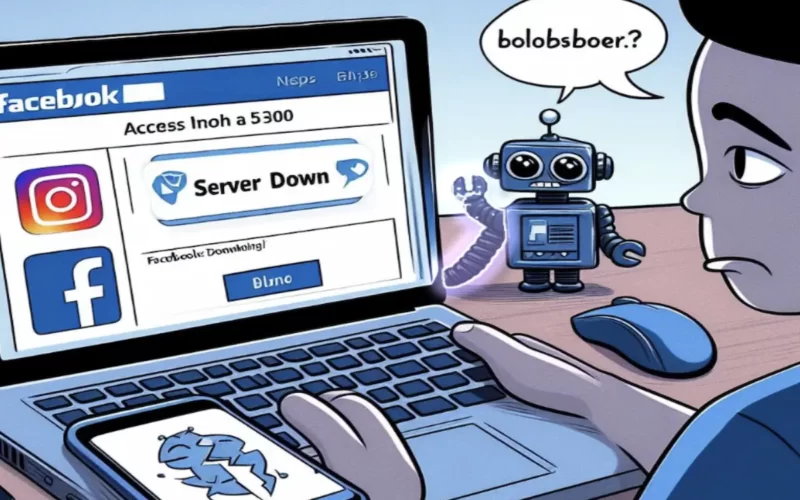Meta’s Epic Fail: WhatsApp And Messenger Go Offline Worldwide
A massive outage hit WhatsApp and Facebook Messenger, disrupting communication for millions worldwide. Users scrambled for alternatives as Meta worked to restore services.

Millions of users worldwide were affected by a significant outage that affected Facebook Messenger and WhatsApp, two of Meta’s most widely used messaging systems. Outages that prevented users from sending messages, making audio calls, or viewing their chats were widely reported on social media. The concurrent outage also questioned the greater dependence on Meta infrastructure and whether such vital communication tools are reliable.
The Scale of the Outage
The blackout started suddenly and affected users across North America, Europe, Asia, and South America. Some users complained of having trouble logging in, while others said they couldn’t send or receive messages. The outage tracker website Down detector showed a massive spike in complaints, with thousands of users indicating disruptions within minutes of the first reports surfacing.
As the problem persisted, hashtags like #WhatsAppDown and #FacebookMessengerDown began trending on X (formerly Twitter), where users shared their frustrations and speculated about possible causes. Many users turned to alternative messaging apps like Telegram and Signal to communicate while waiting for services to be restored.
Meta’s Response to the Outage
Meta, Facebook and WhatsApp‘s parent company, also recognized the issue and gave reassurance that users’ technical teams were immediately looking into addressing the problem. A Meta representative gave a very brief statement in response:

“We know some of our customers are experiencing issues with our messaging services. Our staff is actively working to restore access as quickly as possible, and we apologize for any inconvenience this might cause.”
Despite the promise, the fact that an instant repair did not take place frustrated users who have grown accustomed to these platforms for business and personal communication.
Possible Causes of the Outage
Though Meta has not yet made public the reason behind the outage, analysts have given a variety of explanations:
- Server Overload or Failure: Meta’s enormous server system may have crashed, leading to the downtime. With billions of users accessing the system every day, even small technical issues have a tendency to snowball big.
- Cybersecurity Breach: Users wondered if the outage resulted from a cyber-attack, considering the heightened cases of hacking and security attacks on big technology firms.
- Software or Update Issues: A malfunctioning software update or internal system modification might have been the cause, which would have cascaded into failure for several Meta-owned platforms.
- Infrastructure Problems: Internet or cloud service providers (ISPs) may have caused the disruption, which affected Meta’s message delivery reliability.
Impact on Businesses and Users
To others, WhatsApp and Facebook Messenger are not just run-of-the-mill messaging apps but essentials for business communication, remote work, and customer interaction. The unexpected downtime had far-reaching consequences, particularly for businesses using WhatsApp Business for customer support and transactions.
Some small business owners complained that they might lose potential customers because they could not reply to queries. Freelancers and remote employees were also unable to cope because they could not communicate with fellow workers and clients.

The disruption also highlighted the vulnerability of depending too much on one messaging platform. Most experts have advised businesses and users to diversify their messaging apps to avoid such inconvenience in the future.
Past Outages and Growing Concerns
This is not the first global service disruption that Meta has encountered. WhatsApp, Facebook, and Instagram have all experienced these disruptions in the past, causing hours-of-service interruptions and user annoyance worldwide. Among the most significant outages are:
- October 2021: Due to a DNS configuration error, Facebook, Instagram, and WhatsApp had a significant outage that lasted for many hours.
- March 2019: A prolonged outage impacted all Meta platforms, with users unable to send messages or use services for more than 14 hours.
- June 2020: WhatsApp experienced a brief outage that prevented users from sending or receiving messages.
Rinse and repeat outages have raised concerns about Meta’s infrastructure and whether the corporation is doing enough to avoid repeat outages. Analysts say decentralization of services and less dependence on a single network of servers would help reduce the risks.
What Users Can Do During an Outage
While waiting for services to be restored, the users can take a few steps to minimize the impact of the outage:
- Check Official Sources: Keep yourself informed through Meta’s official social media handles regarding the outage and estimated fixing times.
- Use Alternative Messaging Apps: Messaging apps like Telegram, Signal, and iMessage can be used as backup communication.
- Restart Devices and Apps: Sometimes, simply restarting the app or device can provide connectivity once the issue is resolved.
- Enable SMS and Email Communication: Using traditional SMS or email can be a reliable alternative for urgent messages.
- Stay Updated Through Down Detector: Sites like Down Detector offer real-time service outages and user report updates.
The Bigger Picture: Internet Dependency and Digital Resilience
The Meta shutdown is a stark reminder of our world’s dependence on digital communications services. As technology develops, making such services robust and dependable is becoming increasingly important.

Governments and regulatory bodies also closely watch how digital behemoths like Meta react to such disruptions. There have been demands for increased accountability and openness in handling infrastructure failures affecting millions globally.
The blackout underscores consumers’ and businesses’ requirement for digital resilience. Standby planning, disruption preparedness, and replicating communications networks are all possible means for countering this type of interruption.
Final Thoughts
The most recent Meta outage will further ignite debate on the trustworthiness of centralized communication platforms as Facebook Messenger and WhatsApp continue to revert back to their usual operations. While the cause remains uncertain, the incident shows a further need for cybersecurity regulation, infrastructure management, and redundancy for common users and business customers.
As technology continues to control our lives more and more, the importance of constant communication cannot be overemphasized. This encounter must be an eye-opener for Meta and other tech giants to invest in safer precautions to prevent such disruptions.




